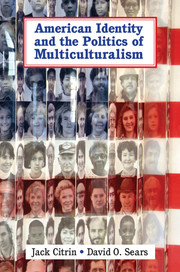Book contents
- Frontmatter
- Dedication
- Contents
- List of Figures
- List of Tables
- Preface
- Prologue
- 1 The Challenge of E Pluribus Unum
- 2 The Political Psychology of Identity Choice
- 3 Contours of American National Identity
- 4 The Ethnic Cauldron and Group Consciousness
- 5 Public Opinion and Multiculturalism’s Guiding Norms
- 6 When Do Ethnic and National Identities Collide?
- 7 Group-Conscious Policies: Ethnic Consensus and Cleavage
- 8 The Dynamics of Group-Conscious Policy Preferences
- 9 Multiculturalism and Party Politics
- 10 Conclusion
- Appendices
- Bibliography
- Index
- References
1 - The Challenge of E Pluribus Unum
Published online by Cambridge University Press: 05 September 2014
- Frontmatter
- Dedication
- Contents
- List of Figures
- List of Tables
- Preface
- Prologue
- 1 The Challenge of E Pluribus Unum
- 2 The Political Psychology of Identity Choice
- 3 Contours of American National Identity
- 4 The Ethnic Cauldron and Group Consciousness
- 5 Public Opinion and Multiculturalism’s Guiding Norms
- 6 When Do Ethnic and National Identities Collide?
- 7 Group-Conscious Policies: Ethnic Consensus and Cleavage
- 8 The Dynamics of Group-Conscious Policy Preferences
- 9 Multiculturalism and Party Politics
- 10 Conclusion
- Appendices
- Bibliography
- Index
- References
Summary
What does the ethnic diversity of the United States imply for its national identity? This question has been asked repeatedly since America’s founding, but the ongoing demographic transformation of the country gives it renewed significance. What are the implications of this increased cultural diversity for e pluribus unum, the creation of one out of many in a nation of immigrants? Has it unleashed unmanageable centrifugal forces? Does the country need new psychological glue to hold a multiethnic polity together in the twenty-first century? In this chapter, we contrast the solutions for managing America’s diversity given by three normative perspectives: cosmopolitan liberalism, nativism, and multiculturalism. We concentrate on how these conceptions strike the balance between group and national identities, how they view the role of the state in responding to the demands of a new array of minorities, and how the implications of their proposed policies may affect national solidarity.
The Liberal Consensus and Its Critics
Almost seventy years ago, a united nation emerged victorious from a great war. Commitment to a common culture seemed to be taken for granted. No political movement then seriously challenged the ideal of e pluribus unum symbolized by the image of the melting pot. Published in 1955, Louis Hartz’s The Liberal Tradition in America provided the dominant scholarly interpretation of American political culture for years to come. This normative view, which we label cosmopolitan liberalism, emphasized that America’s core identity is ideological, not ethnic, not limited to a particular people. For Hartz, as for de Tocqueville and many other commentators, Americanism is a civil religion, a creed comprising belief in the values of democracy, individualism, liberty, equality, and property rights. Hartz, Seymour Martin Lipset, and others also argued that the firm grip of this liberal tradition helps explain the exceptionalism of the country’s politics – the lack of a strong socialist party, the weakness of the labor movement, the acceptance of economic inequality, and the boundaries on government action that limited the development of the welfare state. But the creedal definition of American identity implicitly was inclusive: anyone could belong to America if he or she embraced the civil religion, spoken in English.
- Type
- Chapter
- Information
- Publisher: Cambridge University PressPrint publication year: 2014

